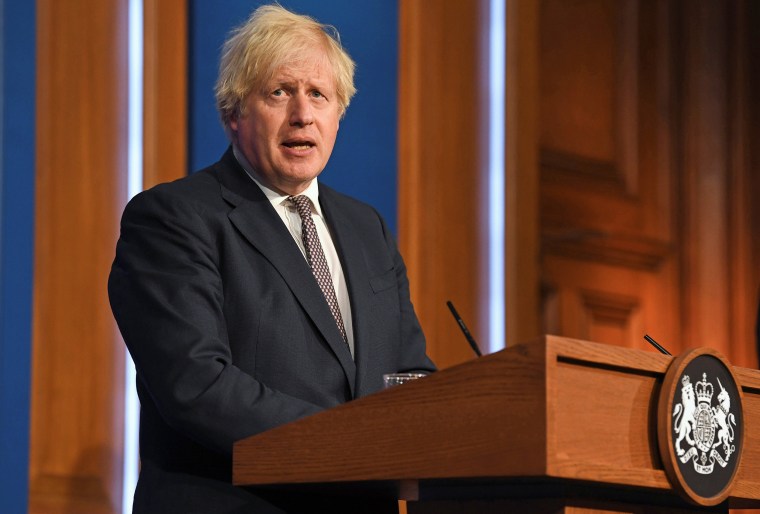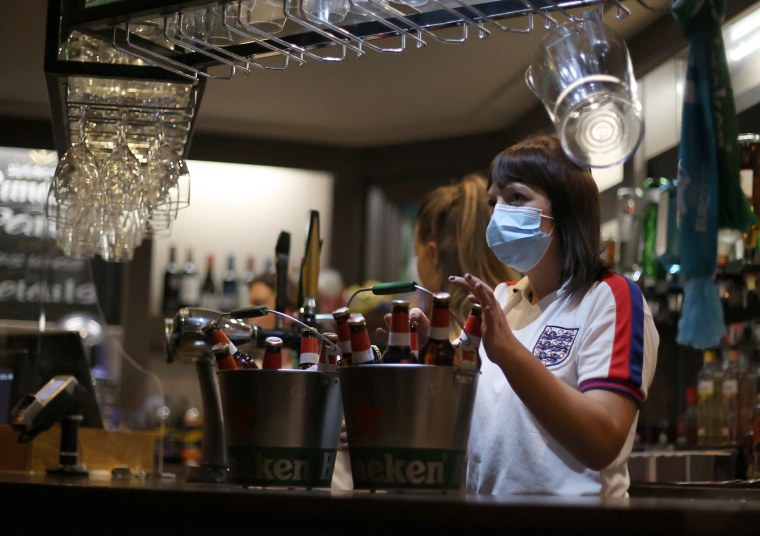LONDON — England is trying to rewrite the pandemic playbook, opening up its society amid skyrocketing cases in the hope its world-class vaccine rollout will prevent more mass deaths.
Daily cases in the United Kingdom are among the highest in the world after the government eased its lockdown while the highly transmissible delta variant began to dominate.
But despite this, Prime Minister Boris Johnson announced plans Monday to lift almost all remaining restrictions in England on July 19 — which has been dubbed "Freedom Day" by right-leaning newspapers. (Scotland, Wales and Northern Ireland govern their own health policies.)
It is a radical course of action that has caused alarm at home and abroad, with some critics suggesting the policy is driven more by the libertarian views of the ruling Conservative Party than by data.

Experts and opposition politicians now view the country as taking a high-risk gamble — one whose outcome will be watched closely by other governments attempting to bring about the coronavirus endgame.
"I think the U.K. government has gone out on a limb with a fairly extreme stance," said Danny Altmann, a professor of immunology at Imperial College London.
That view gained support on Wednesday when more than 220 scientists accused the government of "embarking on a dangerous and unethical experiment."
"Any strategy that tolerates high levels of infection" is "both unethical and illogical," the scientists wrote in a letter in the Lancet medical journal.
Download the NBC News app for breaking news and politics
Typically, most rich Western countries have reacted to waves of infection by imposing restrictions on daily life that are only eased when the numbers start to fall.
Sajid Javid, the new lockdown-skeptic health secretary, said he is prepared to let cases hit 100,000 a day because the U.K.'s vaccination rollout has weakened the link between cases, hospitalizations and deaths.
'I won't be able to cope'
Almost two months after Harry Andrew, a teacher in Newcastle, northeast England, received his second vaccination dose, he started to get a headache, fever, sore throat and runny nose. A test confirmed it as a "breakthrough infection" of Covid-19, which is not unexpected as no vaccine is 100 percent effective.
"At one point I thought, if this gets any worse I'm going to have to call the doctor and get some advice," said the 26-year-old, who believes he caught the virus from his partner, also a fully vaccinated teacher. "I felt like if my fever gets any worse, I won't be able to cope."
The government is banking on the idea that, like Andrew, most people will be vaccinated and therefore won't need medical treatment. In January, the last time cases were this high, there were more than 1,000 deaths reported per day. On Wednesday there were 33.

These are the numbers that lead Javid to argue restrictions are now causing net harm: for mental health, education and struggling businesses.
"We can't live in a world where the only thing that we are thinking about is Covid," Javid told Sky News on Tuesday. "We have to make use of a vaccine that is thankfully working."
Epidemiologists talk about an "exit wave" of cases that will rise when restrictions are lifted no matter how many adults have been given effective-but-imperfect vaccines. Some experts have suggested it's better this strikes in the summer rather than in winter.
'Gambling with their lives'
Altmann referred to a cartoon published Wednesday in The Times of London, showing Johnson as a croupier, tossing a single coronavirus into a roulette wheel.
"To me, that is roughly where we are in terms of the strategy," he said. "I'm data-driven, and I see the number of daily cases heading up in an absolutely terrifying way."
Even the government's own group of advisers, the Scientific Advisory Group for Emergencies or SAGE, warned in a paper Monday there was "significant risk" in the new approach.
This inflection point comes after a year in which the U.K. at times suffered one of the highest death rates in the world. Johnson's government has been plagued with accusations that its initial policy was "herd immunity" — a phrase used by advisers at the time — where the virus would be allowed to let rip among younger people.

The U.K.'s Department of Health and Social Care did not respond to a request for comment.
Today, one of the main fears with allowing sky-high infections among a partially vaccinated population is it will be "like building new variant factories," as Susan Michie, the director of the Centre for Behaviour Change at University College London, tweeted Sunday.
Another major worry is "long-haul Covid-19," which has already hit some 2 million British people with symptoms including anxiety, "brain fog" and heart palpitations, according to a study by Imperial College London.
In accepting 100,000 cases per day, the government is likely also "tolerating 10,000 to 20,000 new cases a day of long-Covid," Altmann said. "Each one of those is a person who might not be able to return to their job or who might not be able to go to college to get their degree."
Now or never?
Johnson responds to all of this by asking: If not now, "when will we be able to return to normal?" as he said Monday at news conference.
But critics say there is little logic in pushing ahead when only two-thirds of adults will be fully vaccinated. They point to Israel, which hastily reintroduced rules over masks last month following a sharp rise in cases.

Offering everyone full protection in the U.K. would only take a few more months. And some say jumping the gun imperils vulnerable people who can't take the vaccine or are immunocompromised.
"For some disabled people, so-called 'freedom day' will not be a cause for celebration but a reason to feel anxious," said Jessica Leigh, campaigns manager at British disability charity Scope. "Many disabled people will be worried that plans to remove all restrictions are gambling with their lives. The government must stop ignoring disabled people in its plans to unlock."
Millions more are likely to get "pinged" by the National Health Service’s Test and Trace app, which orders people to self-isolate for 10 days if they've been near a positive case. Fully vaccinated people can ignore this rule from Aug. 16. Until then, it could cause havoc for the health service, businesses and social lives.
